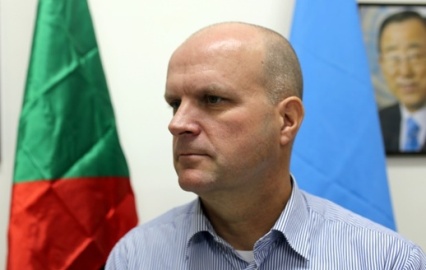UN says Sudan has “de facto expelled” humanitarian official
May 22, 2016 (KHARTOUM) – The Humanitarian Country Team (HCT) in Sudan Sunday said the Sudanese authorities declined to renew a permit for the head the United Nations Office for the Coordination of Humanitarian Affairs (OCHA), saying he was being effectively expelled from the country.

In a statement extended to Sudan Tribune, HCT expressed “shock and disappointment at the de facto expulsion by the Sudanese government of one of its senior UN officials, the head of OCHA Ivo Freijsen”.
According to the statement, Sudan’s Ministry of Foreign Affairs has informed the United Nations in Sudan that Freijsen’s annual stay permit will not be renewed when it expires on 6 June 2016.
“This is despite the request for a 12-month extension of his stay permit, as per routine process, which was submitted on 10 April 2016. The Ministry of Foreign Affairs has provided no official explanation in writing for this decision” read the statement
HCT further said the government action is “inconsistent with the fundamental principles of the international civil service enshrined in the Charter of the United Nations, the organisation’s foundational treaty, to which Sudan is a party”.
It expressed concern about the impact of the government decision on “the operating environment for all humanitarian organisations in Sudan, which provide emergency relief, and early recovery and transitional assistance to those in need”.
Freijsen is the fourth senior UN official to be expelled from Sudan in the last two years.
“This comes in addition to the forced closure of international NGO Tearfund in December 2015 and the de facto expulsion of three international NGO country representatives in recent months,” the statement added.
The international office underscored that it would remain committed to supporting the Sudanese people and government in providing humanitarian assistance, calling on the latter to ensure a fully conducive environment for delivering timely, principled and quality humanitarian assistance.
Freijsen was appointed to his position by the Under-Secretary-General for Humanitarian Affairs and Emergency Relief Coordinator, on behalf of the UN Secretary-General, in February 2014. He has worked for over a decade in Sudan.
Meanwhile, in a statement extended to Sudan Tribune Sunday, Sudan’s Humanitarian Affairs Commission (HAC) said that Freijsen was appointed as head of OCHA for a transitional period, noting the government has accordingly granted him a work permit in Sudan.
It added that the government has extended his permit for further periods until May 2016 in appreciation for the UN work in Sudan, pointing his application for permit renewal was denied after the government allowed the UN enough time to appoint a permanent director but it never did.
According to the statement, “the relationship between the government and UN became weak due to Freijsen’s negative attitude towards the Sudanese government”.
A Sudanese official told Sudan Tribune under the cover of anonymity that Freijsen continued to “issue subjective and inaccurate reports about the humanitarian situation in Sudan” besides his repeated allegations that the government doesn’t allow access to the needy population.
He added that Freijsen issued undocumented reports on government bombing of civilians in South Kordofan, Blue Nile and Jebel Marra besides accusations on restrictions imposed by the government on the humanitarian work.
He went to say that Freijsen also published wrong information saying that Sudan suffers from a food crisis and famine which created negative image for the country and sparked panic among the population.
However, HAC expressed keenness to cooperate and coordinate with the UN agencies and aid groups, calling on them to work in accordance with the humanitarian principles and commit themselves to the national laws regulating the humanitarian work in Sudan.
(ST)
